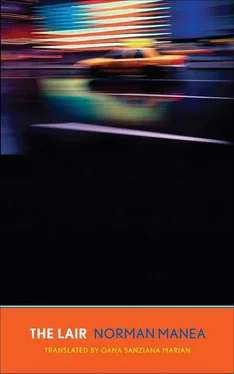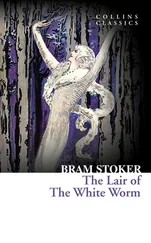Another pause for air, his voice lowered, a sigh.
“And what about us, in this tiresome democracy? Are we following the script? What do you say, Professor? Do we get a new car every few years, a new wife, a new look? Do we renew our organs and our cheek, go daily to the gym and the bank, to our modern temples? Do we buy a vacuum, a hairpiece, spare kidneys, new hearts, second homes? We’re joking, right? Here, any funereal discourse begins with a joke, isn’t that right? That’s what you told me; you were trying to explain the New World to me, Mynheer’s world, isn’t that right?”
Gora didn’t answer. Even his groaning had grown quiet, he seemed to have dozed off.
“Could I revive my unknown sister, I wonder? Or will I obtain immortality from the Great Assassin in the sky? Do you think the Almighty forgot about me, somehow, among his post-Auschwitz projects?”
Gora unclasped his palms from his cheek, pressed them on the edge of the table, strained to raise himself up, pressed the switch on the desk lamp.
The light found him upright, stiff. The glass in the window reflected his wrinkled face and grizzled hair.
The moon was retreating from the sky, defiantly. The dawn was coming, the fires of a new day.
Gora’s face had frozen in the mirror of the window.
The American papers barely mentioned Professor Palade’s assassination. Some articles in the local press, but echoes and rumors continued only within the university.
The stir in his native country was incomparable. In the chaos of post-Communism and the crush of the capitalist emissaries, the East writhed with bitterness and resentment. The wonder that had toppled the dictatorship, and the less wonderful wonders that fol-lowed, intensified the disorienting transition toward something indefinable. The crime happened somewhere far away, in a multicolored gangster’s America; even in his death, the victim mobilized contentious opinions.
A crime with a bizarre aim, perfectly executed, by a professional. Those who’d planned the execution couldn’t have had more than an ideological motive. It was said that Palade’s publications were increasingly critical of the nationalism that Dima had served, and of the ever-active Communist secret police. A Sicilian execution, though not for money; he was an ideological adversary. Was there a connection between extreme right-wing expatriates in America and his native country’s former Communist secret police, which infiltrated everywhere? Palade represented a disturbing voice for both camps.
While he was rewriting the review of Dima’s memoirs for the tenth time, Peter feverishly followed the university news, the police investigations, and speculations drawn from coffee cups and stars by friends of the parapsychologist Palade. He never withdrew the review sent to Larry Two; neither did he supply an addendum about the assassination of Dima’s infidel apprentice.
By the time the text appeared, nearly a year after the assassination, the American police had long given up the investigation due to lack of funds. And yet Larry Two didn’t hesitate to mention the sensational slaying on the cover of the magazine. It would be hard to say whether or how much it helped sales. It certainly perpetuated the rumors in the faraway country. The guilt of the traitor Palade had been connected to the conspiracy against Dima. Ga  par had become associated with Palade. Who is hiding behind the name of this Peter and who is this Ga
par had become associated with Palade. Who is hiding behind the name of this Peter and who is this Ga  par? Were they code names of the Masons of wherever and everywhere? Or, a strung-out fugitive traitor serving obscure antinationalist interests!
par? Were they code names of the Masons of wherever and everywhere? Or, a strung-out fugitive traitor serving obscure antinationalist interests!
His audience didn’t seem to remember his story Mynheer from long ago, nor the nickname, nor its motivation, nor the old rumors of a mysterious masterpiece hidden in his mind or in his cupboards.
Larry One, alias Avakian, the president of the college where the traitor was operating, had found out about the hysteria in the press across the sea. He’d found the headline under the American review very provocative. The college informed the FBI about the potential danger to the reviewer, and about his relationship with the assassinated.
Ga  par turned sleepless and irritated, and Gora felt guilty for opting out of writing the text about Dima himself. One of the epithets with which Ga
par turned sleepless and irritated, and Gora felt guilty for opting out of writing the text about Dima himself. One of the epithets with which Ga  par had been overwhelmed would not have been there. Ashamed, he tried to forget.
par had been overwhelmed would not have been there. Ashamed, he tried to forget.
In the meantime, Peter was receiving letters from American readers who were shocked by the ambiguities of the review. So much attention and so much scruple afforded to an extremist who sided, along with his country, with Nazi Germany? The reviewer seemed to excuse him — or worse, in fact — to actually admire the Nazi, one professor of ethnic studies from California said. A young poet posed the question, “How do you separate one being into two separate ones? You maintain that the political writings should be held apart from the scientific and literary works. Do they belong to another person? Wouldn’t it be worthwhile to find this other person? To see what he has to say? Aren’t you implying a kind of censorship, somehow? Where do we stand on the unity of the contraries mentioned by the illustrious deceased?”
Ga  par didn’t appear affected by this kind of correspondence. The good, the true, and the beautiful? His new compatriots ignored the beautiful, the good had to be evident and canonical, and the truth without stain. Always this need for coherence and for churches! They don’t care at all about aesthetics. Scared of contradictions, they don’t understand that incoherence is their greatest realization, the triumph of their democracy.
par didn’t appear affected by this kind of correspondence. The good, the true, and the beautiful? His new compatriots ignored the beautiful, the good had to be evident and canonical, and the truth without stain. Always this need for coherence and for churches! They don’t care at all about aesthetics. Scared of contradictions, they don’t understand that incoherence is their greatest realization, the triumph of their democracy.
How had he let himself be “cheaply bought” by the glory of a “disgusting, fascist library rat?” asked a political science student from Kansas.
The wryness with which he took in the calumnies of his own country showed, however, that he had failed to emigrate. The past was still alive in the present. His wounds coexisted with the illusions that provoked wounds. He was dragging his native terrain with him everywhere he went.
“I have in front of me one of our respectable cultural journals. From some time around Easter. Christian iconography. The Savior on the cross. The title is: The Crucifixion of Dima.”
“Where did you get that journal? Who sent it to you?”
“Palade’s brother. Lucian. It would seem that I’m the one who upholds the vigilance and good humor of the Nation, week to week. The spy across the ocean, c’est moi.”
After this intermezzo, Gora didn’t want to hear anymore. When some new information came, he refused to comment, accepting Ga  par’s aggression mutely.
par’s aggression mutely.
“Lu forced our coming to America. They’d taken the cap off the bucket of slops. Freedom. Poisoned, daily, poisoned. Filth that had been hidden for decades on end exploded at every step, just like the day when Lu had parked the car belonging to the driving school. She was just getting out of the car, when the angry man yelled, ‘Why don’t you all leave and go back to your Arab cousins!’ The unknown man had tried, probably, to find a parking spot and the car with the big driving school sign was in the way. Surprised, Lu turned around to see whom he was addressing. She’d never seen that brawler before. There was no one else around, as you might guess.”
Читать дальше

 par had become associated with Palade. Who is hiding behind the name of this Peter and who is this Ga
par had become associated with Palade. Who is hiding behind the name of this Peter and who is this Ga 










